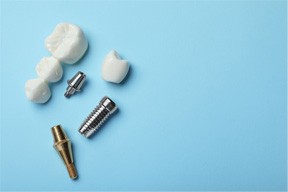Dentures – Mesquite, TX
The Tried-and-True Tooth-Replacement Treatment
According to the Centers for Disease Control and Prevention, about 17% of adults over the age of 65 have lost all of their teeth. Another study from the American College of Prosthodontists found that 178 million people in the U.S. are missing at least one tooth. We share all this because if you’re struggling with tooth loss – even if you don’t have any of your natural teeth left, you’re not alone. Perhaps even better news is that there is a tried-and-true solution: dentures in Mesquite, TX. To learn more about this tooth-replacement option, keep reading!
Why Choose Riviera Family Dentistry of Mesquite for Dentures?
- Caring and Compassionate Dental Team
- Convenient Hours, Including Evenings
- Partner with Trusted Dental Implant Surgeons
Who’s a Good Candidate for Dentures?

Whether you’ve lost just a few or all your teeth, anyone who has suffered tooth loss can potentially benefit from dentures. However, before deciding whether it’s the best solution for you, you must schedule a consultation with one of our dentists. They’ll examine your mouth and make a professional recommendation based on your current oral condition. If they find that you’re not a good candidate for this treatment right away, don’t worry! In many cases, other fixes are needed first so that your mouth is strong enough to support them.
Continue reading below to learn more about who dentures can help, and feel free to reach out with any additional questions!
Effects of Missing Teeth

There are many potential problems that can lead to tooth loss, but the leading cause is gum disease. When bacteria penetrate below your gumline, they cause an infection that causes the connective tissues to recede. As a result, more of your roots are exposed, and your teeth become loose or can fall out. Other common causes include tooth decay or physical trauma.
Regardless of the reason, missing teeth can greatly detract from your daily quality of life. You might develop a lisp or have a hard time enunciating words, have difficulties chewing your food, and might feel too self-conscious to genuinely smile. Dentures restore your smile’s functionality and appearance so you can feel more like yourself again.
What Qualifies You for Dentures?

Dentures are a versatile solution that can replace a few or all your missing teeth, but how do you know if they’re right for you? Some potential indicators that you could benefit from these prosthetics include your:
- Gum health. If you have periodontal disease, we’ll work with you to clear it up before fitting you with your restoration. It relies on a tight suction against your gums to remain in place, so the tissue must be healthy.
- Jawbone density. Your jaw starts to thin after tooth loss, which can lead to flattened ridges that won’t support your prosthetics.
- Oral hygiene. It’s imperative to clean your mouth and your artificial teeth every day, so you’ll need to commit to a regular routine.
- These replacement teeth are less costly than alternatives like dental bridges and implants.
Alternative Tooth-Replacement Options

If our experts determine that dentures may not be the best way to refurbish your smile, don’t lose hope. There are other options! You might do better with a different treatment, such as:
- Dental bridges. These are ideal for people who have lost one or multiple teeth in a row. They consist of the right number of pontics (artificial teeth) with a dental crown on either side that anchors them in place.
- Dental implants. For this method, you’ll have titanium posts surgically embedded into your jaw for added security and stability. These permanent prosthetics aren’t intended to be removed.
Types of Dentures

At Riviera Family Dentistry of Mesquite, we offer three different types of dentures: partial, full, and implant-retained. At your consultation, one of our talented dentists will learn a little more about your dental history and smile goals before making a recommendation. However, you’re welcome to read on to learn a little bit more about each one!
Partial Dentures
Partial dentures act like a puzzle piece, effortlessly filling in the gaps in your smile to restore its appearance and function. Not only are these restorations custom-made so they fit perfectly, but they are also crafted from durable materials that look extremely lifelike. Plus, they are secured in place with a discreet metal clasp, ensuring no unwanted attention is drawn to your smile either.
Full Dentures
Full dentures, on the other hand, are designed for patients who are missing an entire arch of teeth. While the gum-colored base and lifelike prosthetic teeth are similar to partial dentures, there’s a distinct difference: full dentures are held in place with natural suction, denture adhesive, or a mixture of the two so there’s no unwanted movement when you laugh, talk, or chew.
Implant Dentures
Implant dentures are unique because they don’t get support from your gums. Instead, they are secured in place with dental implants, which provide unmatched stability and strength. There are also several other benefits to consider, including a longer lifespan (implant dentures can last for well over a decade with proper care!).
How Dentures Are Made

Modern-day dentures aren’t like the ones that your grandparents had. They are customized to fit perfectly comfortably in your mouth while offering a natural appearance. However, to provide these benefits, dentures require a multi-step process. Continue reading to learn more about dentures, how they are made, and what you can expect as you adjust to your new denture.
What are Dentures Made Of?

Dentures are comprised of two different parts – the base and the replacement teeth. Here is what each of them consists of:
- Base: The base is the foundational structure of the replacement teeth. It can be made from many different materials, including acrylic, nylon, porcelain, resin, or metal. Acrylic is the most commonly used material because it can be easily tailored to match your gum tissue, leaving you with a natural appearance.
- Teeth: The replacement teeth are generally made from resin or porcelain because they appear very similar to natural tooth enamel – even in the way that they reflect light. However, porcelain is a more popular option for full dentures because it is more durable.
The Denture Creation Process

Dentures are customized for each patient’s mouth. This requires several steps to achieve the most accurate results. Here is an overview of the process:
- First, your dentist will take measurements of your jaw and impressions of your upper and lower gums. This is used to make a plaster model of the mouth. It will be used to ensure that the final denture fits perfectly.
- The model is sent to the dental lab. This is where your dentures will be made. First, your replacement teeth are set into place using a mechanical device called an “articulator.” Adjustments are made by a lab technician.
- The wax dentures are sent back to your dentist for a fitting. If everything looks good, they are returned to the dental lab to complete the process.
- After the dentures are returned to the dental laboratory, the wax needs to be replaced with acrylic. To do this, the lab technician places the dentures into a flask. Plaster is poured into the flask to maintain the shape of the dentures. Then, the entire flask is placed in hot water to melt the wax.
- The plaster is carefully removed from the dentures using dental tools. The dentures are placed into an ultrasonic bath to wash away the rest of the plaster.
- Any excess acrylic is cut from the dentures. Then, they are polished to perfection.
- Now that your dentures are complete, you can return to the dental office so you can try them on. If you are your dentist are happy with the results, you can leave the practice showing off your new, completed smile!
Adjusting to Your New Dentures

After you get your dentures, you may experience some soreness, but this isn’t anything to worry about. Temporary discomfort is common as one adjusts to their new prosthetic. After some time, your dentures will begin to feel more and more natural. When you first get your dentures, it’s a good idea to stick to softer foods and exercise your facial muscles. If discomfort persists or you have any concerns, don’t hesitate to give us a call so we can help!
The Benefits of Dentures

Here are a few of the many reasons so many patients choose dentures to restore the look, health, and function of their smile:
- Boosted confidence
- Clearer enunciation
- Cost-effective
- Custom-made for each patient
- Look and feel natural
If you’re ready to take your next step toward a complete smile, reach out to our Mesquite dental team!

